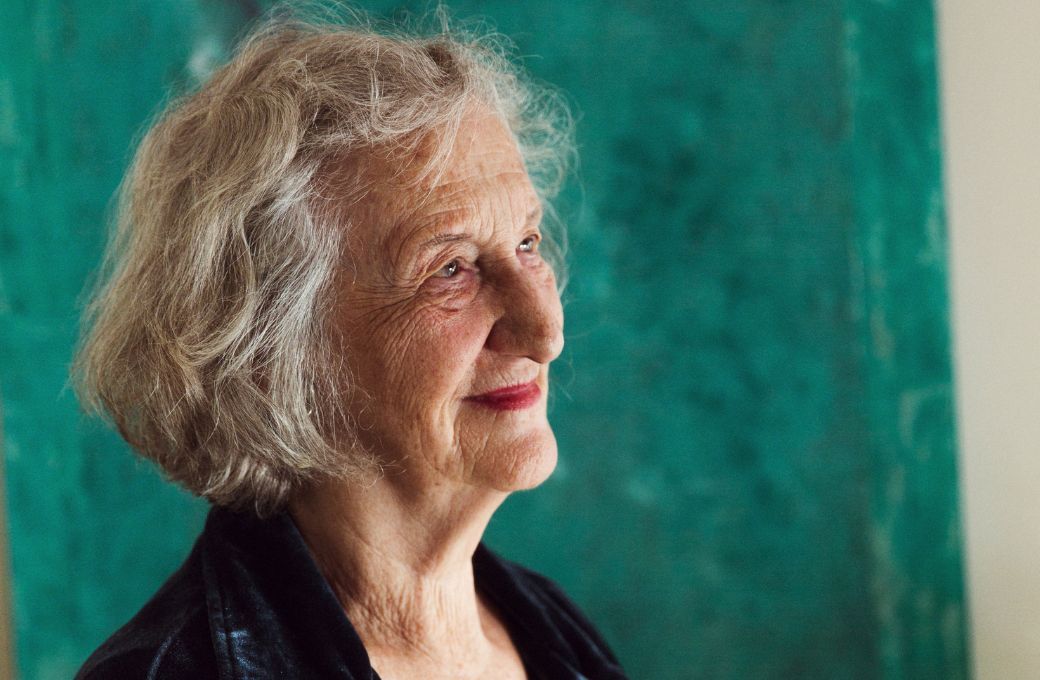This article was updated in January 2025
“I don’t know how to say it without being arrogant: there’s something else beyond the technique that you need to make things sing, to make things work, to make things a performance.”
It speaks to Thea Musgrave’s unpretentious demeanor that she’s at all concerned about coming off as pompous when talking about her compositional practice. Any arrogance – if it indeed existed – would be well-earned: over her 70-year career she has been lauded for her operas about such radical historical figures as Mary, Queen of Scots and Simón Bolívar, as well as orchestral pieces that unseat assumptions about the relationships between soloist, orchestra and the concert hall. This year [2018] sees her celebrate her 90th birthday, coinciding with performances of her work by organisations across the world, including a major focus at Stockholm International Composer Festival in November 2018 – the largest presentation of her work in Sweden to date.

It’s interesting that such a master craftswoman didn’t start off in music. When she first came to the University of Edinburgh in 1947, it was to study medicine. “What I was interested in the medical profession was not so much being a doctor as discovering things,” she tells me. “I wanted to discover the cures for all sorts of diseases, and with the arrogance of the very young, thought I could do this.” The adjacent music school tempted her away from her scientific studies (“I realised then that one lives once – you might as well do what you’re passionate about”), but it’s not hard to imagine that this impulse toward discovery seeped into her activities as a composer.
It’s an appraisal her husband, the opera conductor and artistic director Peter Mark, agrees with, saying that she is “very concerned with the details,” which she approaches in “the way a scientist would work and experiment.” Musgrave’s early actions were guided by two figureheads: one, the musicologist Donald Francis Tovey, whom she never met, but through devouring his writings she gained her own sense of “long-term harmonic planning, how you range that journey, how long each part of the journey is, what events happen on that journey.”
Meanwhile, the influential composer and pedagogue Nadia Boulanger, whom Musgrave studied with in Paris, instilled in her an appreciation for minutiae. “She thought about every single detail at any single moment,” says Musgrave, who also doesn’t have much time for being labelled a “female composer”. One imagines that Boulanger – whose sign of appreciation for female students was reportedly to call them “monsieur” – may have influenced her in this regard too.
Yet it’s interesting to note that in Konserthuset Stockholm’s (Stockholm Concert Hall, stomping ground of the Royal Stockholm Philharmonic Orchestra) 2018/19 season, Musgrave will enjoy the company of a great many other female composers. In fact, the preponderance of female artists on the programme is arguably to an unprecedented level, tracing a sometimes neglected history that spans Hildegard von Bingen through the Baroque compositions of Isabella Leonarda, to Romantic-era composers like Louise Farrenc and Fanny Mendelssohn. More recent outliers such as Germaine Tailleferre and the English composer and suffragist campaigner Dame Ethel Smyth are also featured, as are the Boulanger sisters, while there is a striking focus on living female composers, from established greats like Sofia Gubaidulina and Kaija Saariaho to younger talents like Andrea Tarrodi and Helen Grime. While Musgrave is undoubtedly a distinguished artist in her own right, Stockholm’s highlighting of other female composers will be a welcome sight for many.
With her artistic pedigree, it’s perhaps unsurprising that Musgrave has a rigorously defined conception of music-making, synthesized from her studies with Boulanger and Tovey. Writing music, she tells me, all comes down to the long-form structure of the piece – its “journey” – and the relationships between instruments. But there’s also something a little more elusive. “Underneath or above that, there’s the passion, the drama, and that has to lock into something quite individual – your own voice, whatever it is,” she says. “Everybody has a different voice. But you have to lock into something that’s powerful and that’s going to reach out to other people.”
The idea of conflicting voices speaking through music feeds into the “dramatic-abstract” style that she’s known for; abstract because it lacks any definite programme, but dramatic because the instruments take on roles (what Mark calls “personae”) and interact with one another. In the 1968 Concerto for Orchestra – famously inspired by Musgrave’s dream in which a clarinettist in the orchestra stood up and defied the directions of the conductor – the free-flowing, virtuosic clarinettist breaks from the timing of the other musicians, only joining back up with them at certain points in the piece. The 1971 Horn Concerto goes a step further, with the soloist directing the brass section independently from the conductor, placing them in different areas of the concert hall and responding to them in dialogue. “In a concerto, you have the cadenza where the soloist plays freely,” says Musgrave. “But I said why not have several people in that free section?”
Not everything in Musgrave’s oeuvre is so conceptually complex, however; later works such as the Songs for a Winter’s Evening display a more direct style, drawing on the poetry of Robert Burns. “It was through Burns that I learned to explore a Scottish heritage,” says Musgrave, reflecting an understandable impulse given that she’s lived away from her country of birth since emigrating to the States in the early 1970s. “He wrote poems to preserve the tunes which he loved. They were often fiddle tunes, with a very wide tessitura. But sometime in the 19th century, the tunes were re-written, and they are very boring to my mind.” Consequently, Musgrave draws on the older, wilder folk melodies for the pieces, underpinning them with harmonic complexities that mean things never slip into misty-eyed nostalgia – as the composer observes in her notes to the work, we can never escape our contemporary perspectives.
These days Musgrave is keeping her shoulder to the wheel, rising at six in the morning to get to her composing: “My brain works best in the morning,” she says. “Then it closes down and I do other stuff... all the bullshit stuff that you have to take care of.” Recent projects include a piece for piano and baritone based on the 17th-century Spanish writer Calderón’s La Vida es Sueño (Life is a Dream), which is due to receive its world première in May. She keeps abreast of contemporary opera and chamber music – Kaija Saariaho and Thomas Adès being two interests – and the upcoming performances of her work in Sweden are a particular cause for excitement. “I’ve never been to Sweden,” she says. “So I’m absolutely thrilled to be going there and meeting the orchestra.” At the festival, audiences will be treated to dramatic-abstract works like the Concerto for Orchestra, but also more programmatic pieces such as Turbulent Landscapes, inspired by Musgrave’s deep love for the paintings of Turner. Works featuring unusual instrumentation, such as the Journey through a Japanese Landscape for marimba and orchestra as well as pieces for woodwind and electronics, are also granted a significant chunk of the programme. Musgrave’s practice of forming close relationships with soloists is also addressed, with oboist Nicholas Daniel, with whom she has worked since the 1990s, also appearing: “He’s a wonderful performer and has been a treasure.”
Having composed for such a long time, one wonders what advice Musgrave has for younger generations of musicians. Early in her career, she benefited from outfits such as the BBC Scottish Symphony Orchestra being willing to try out brand new works and she feels such connections are an essential resource for any burgeoning artist. “Young people have to find ways of getting practical experience and that is very difficult these days,” she says. Fostering close relationships with soloists is also important, but, whether one has contacts in orchestras or no, it all comes down to personal resolve. “You’ve got to be true to yourself,” says Musgrave. “You’ll get criticism and comments from other people, and you always listen and maybe learn from them. But in the end, you need to be true to your own voice, what you’re passionate about.” And that’s not to forget that more ineffable quality: “The passion that has to link it all together, and make the whole thing come out in fire and flame: everything that nobody can resist – hopefully!”
Find forthcoming performances of Thea Musgrave's works here
This article was sponsored by Konserthuset Stockholm.


